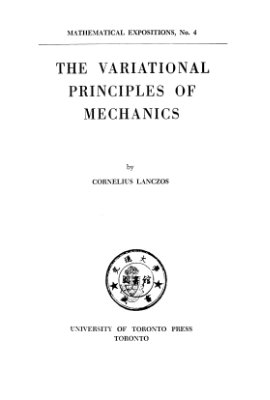University of Toronto Press, 1949. - 327 pages.
Philosophic, less formalistic approach to perennially important field of analytical mechanics. Model of clear, scholarly exposition at graduate level with coverage of basic concepts, calculus of variations, principle of virtual work, equations of motion, relativistic mechanics, much more. First inexpensive paperbound edition.
For a number of years the author has conducted a two-semester lecture course on the variational principles of mechanics at the Graduate School of Purdue University. Again and again he experienced the extraordinary elation of mind which accompanies a preoccupation with the basic principles and methods of analytical mechanics. There is hardly any other branch of the mathematical sciences in which abstract mathematical speculation and concrete physical evidence go so beautifully together and complement each other so perfectly. It is no accident that the principles of mechanics had the greatest fascination for many of the outstanding figures of mathematics and physics. Nor is it an accident that the European universities of earlier days included a course in theoretical mechanics in the study plan of every prospective mathematician and physicist. Analytical mechanics is much more than an efficient tool for the solution of dynamical problems that we encounter in physics and engineering. However great may be the importance of the gyroscope as a practical instrument of navigation or engineering, it is not needed as an excuse to demonstrate the importance of theoretical mechanics. The very existence of the general principles of mechanics is their justification.
Philosophic, less formalistic approach to perennially important field of analytical mechanics. Model of clear, scholarly exposition at graduate level with coverage of basic concepts, calculus of variations, principle of virtual work, equations of motion, relativistic mechanics, much more. First inexpensive paperbound edition.
For a number of years the author has conducted a two-semester lecture course on the variational principles of mechanics at the Graduate School of Purdue University. Again and again he experienced the extraordinary elation of mind which accompanies a preoccupation with the basic principles and methods of analytical mechanics. There is hardly any other branch of the mathematical sciences in which abstract mathematical speculation and concrete physical evidence go so beautifully together and complement each other so perfectly. It is no accident that the principles of mechanics had the greatest fascination for many of the outstanding figures of mathematics and physics. Nor is it an accident that the European universities of earlier days included a course in theoretical mechanics in the study plan of every prospective mathematician and physicist. Analytical mechanics is much more than an efficient tool for the solution of dynamical problems that we encounter in physics and engineering. However great may be the importance of the gyroscope as a practical instrument of navigation or engineering, it is not needed as an excuse to demonstrate the importance of theoretical mechanics. The very existence of the general principles of mechanics is their justification.

